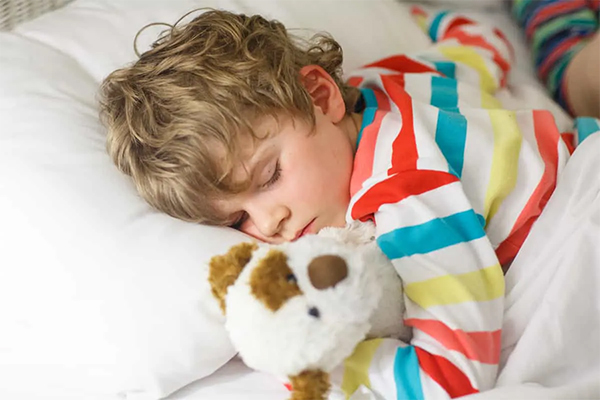Helping a Child with ASD Get Better Sleep
BY KERRY PETERSON, MA, CCC-SLP, BCBA
Speech-Language Pathologist
Board-Certified Behavior Analyst
A good night’s sleep is critical for all children as it con-tributes to healthy growth, improved attention and learning, and reduced risk for illness and injury. “Good sleep” means the child falls asleep within a short time after being put to bed and sleeps through the night.
Children on the autism spectrum are even more likely to have sleep difficulties, such as taking a very long time to fall asleep, an inability to fall asleep on their own, and frequently waking in the night. However, our research-based methods can help all types of kids. In the absence of a medical cause for challenges, these steps may help your child get a better night of sleep.
Establish an appropriate schedule
If a child takes more than 15-30 minutes to fall asleep, it’s possible they are being put to bed too ear-ly. Be sure your child gets plenty of active engage-ment, sunlight, and exercise during the day so they are tired at night. Avoid naps as naptime hours can result in difficulty falling asleep at night.
Create predictable nighttime routines
These activities should be calming for your child and completed in the same order every night. Visual schedules are helpful to let the child see what’s ahead. If possible, move your child’s least-preferred tasks to earlier in the day. For example, if teeth brush-ing causes tantrums, do it after dinner but well before bedtime. Limit snacks and drinks with sugar or caffeine throughout the day and limit all food and drinks 90 minutes before bedtime.
Ensure an optimum sleep environment
Establish the bedroom as a place to sleep and be sure toys, electronics, and other fun items are out of bounds at bedtime. Cooler temperatures and dim lighting can encourage sleepiness. White noise or a fan may be better than music for helping your child fall asleep.
Identify sleep dependencies
These are items that we associate with falling asleep. While some are helpful as comfort items (such as a favorite stuffed animal), others are not conducive to good sleep, including being rocked to sleep, watching TV to fall asleep, and requiring the presence of anoth-er person to fall asleep.
Reduce interfering behaviors
If a child keeps getting out of bed and adults offer snacks, hugs, kisses, and attention, it’s likely they will get out of bed more often. Instead, reward your child for staying in bed all night by giving them a “great night ticket” they can trade in for a preferred activity during the next day.
